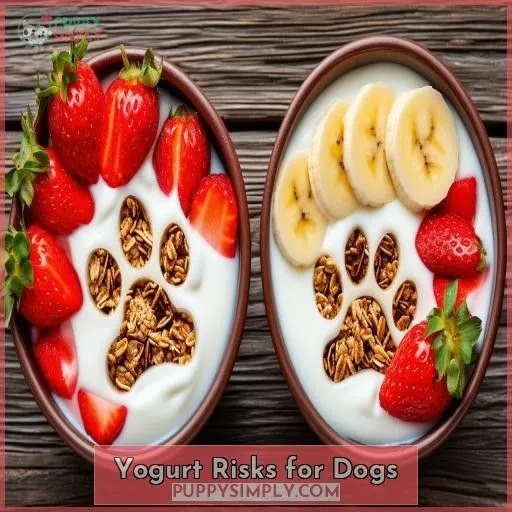This site is supported by our readers. We may earn a commission, at no cost to you, if you purchase through links.
 Can dogs eat strawberry banana yogurt? While it might seem like a delicious snack for your pup, caution is essential. Strawberry banana yogurt often contains added sugars and artificial sweeteners, which can be harmful to dogs. Additionally, lactose in yogurt can cause digestive issues like diarrhea and vomiting, especially in lactose-intolerant dogs.
Can dogs eat strawberry banana yogurt? While it might seem like a delicious snack for your pup, caution is essential. Strawberry banana yogurt often contains added sugars and artificial sweeteners, which can be harmful to dogs. Additionally, lactose in yogurt can cause digestive issues like diarrhea and vomiting, especially in lactose-intolerant dogs.
Plain, unsweetened yogurt is the best option if you want to treat your dog without these risks. Remember, always start with small portions and monitor your dog’s reaction. Stick around to find out how to safely incorporate yogurt into your dog’s diet.
Table Of Contents
- Key Takeaways
- Can Dogs Eat Strawberry Banana Yogurt?
- Can Dogs Eat Yogurt?
- Nutritional Value of Yogurt
- Yogurt Risks for Dogs
- Best Yogurt for Dogs
- Introducing Yogurt to Dogs
- Yogurt as a Dog Treat
- Strawberry Banana Yogurt Safety
- Probiotic Benefits for Dogs
- Yogurt Alternatives for Dogs
- Frequently Asked Questions (FAQs)
- What kind of yogurt can dogs eat?
- Is strawberry flavored yogurt good for dogs?
- Can dogs eat bananas and yogurt?
- Are strawberries and bananas OK for dogs?
- Can dogs eat lactose-free yogurt?
- Is organic yogurt better for dogs?
- How to store yogurt for dogs?
- Can puppies eat yogurt safely?
- Does yogurt help with dog allergies?
- Conclusion
Key Takeaways
- Strawberry banana yogurt is a no-go: It’s like giving your pup a sugary treat that can upset their tummy.
- Plain yogurt is the paw-some choice: It’s like giving your furry friend a healthy snack that’s easy on their stomach.
- Probiotics in yogurt can give your dog a gut feeling: They’re like tiny helpers that keep their digestive system running smoothly.
- Always consult your vet before sharing yogurt with your dog: They can help you find the best options for your pup’s unique needs.
Can Dogs Eat Strawberry Banana Yogurt?
Yes, dogs can eat strawberry banana yogurt, but it should be free of added sugars and artificial sweeteners to guarantee safety (Source). Always check the yogurt’s ingredients and consult your vet before giving it to your dog .
Can Dogs Eat Yogurt?
You may have wondered, "Can my furry pal enjoy a scoop of yogurt?"
The answer is yes, but with some caveats.
While yogurt offers protein and probiotics, many dogs struggle to digest lactose, the natural sugar in dairy.
Plain, unsweetened yogurt is generally safest.
Avoid artificial sweeteners like xylitol – toxic to pups.
Start slow and monitor for tummy troubles.
If your pup tolerates yogurt well, it can make a tasty, nutritious treat in moderation.
Nutritional Value of Yogurt
Yogurt is an excellent source of protein, calcium, and probiotics – nutrients that can benefit your dog’s overall health. The protein and calcium content in yogurt support strong bones and muscle development, while the probiotics aid in maintaining a healthy digestive system.
Protein
You might be wondering about the protein content in yogurt. Yogurt is an excellent source of high-quality protein, which is essential for your dog’s growth and development.
The protein in yogurt is easily digestible, making it a great addition to your dog’s diet. Protein from yogurt can help maintain your furry friend’s muscle mass and support their overall health.
Just be mindful of the yogurt type and any potential allergies before indulging your pup.
Calcium
You’re likely aware that yogurt provides calcium, essential for your pup’s bone health and dental care. But did you know low-fat, naturally flavored yogurts can enhance calcium absorption? Avoid flavored varieties with excess sugar, as too much can lead to calcium deficiency and osteoporosis. With moderation, yogurt is a pawsitively delicious calcium source – just confirm it’s dog-safe!
Probiotics
You might’ve heard yogurt has probiotics – good bacteria that support your dog’s digestive system. While regular yogurt can benefit dogs, be cautious. Many contain lactose which causes gas or diarrhea if your pup’s intolerant. Plus, watch for xylitol – an artificial sweetener toxic to dogs. For safer probiotic sources, consider dog-specific supplements or frozen yogurt treats.
Yogurt Risks for Dogs
While yogurt can offer some nutritional benefits for dogs, certain types pose risks due to lactose intolerance, artificial sweeteners, and high fat content. Strawberry banana yogurt, in particular, may contain added sugars or sweeteners that can be harmful to your furry friend.
Lactose Intolerance
You should watch out for lactose intolerance when feeding yogurt to dogs. While yogurt contains probiotics that aid digestion, dogs may struggle to break down lactose – the natural sugar in dairy. If your pup can’t properly digest lactose, yogurt could cause vomiting, diarrhea, and other digestive woes. Consider non-dairy, probiotic-rich alternatives like kefir for a tasty, gut-friendly treat.
Artificial Sweeteners
In addition to lactose, you’ll want to avoid yogurts with artificial sweeteners. Many contain sugar substitutes that are toxic for dogs, like:
- Xylitol
- Aspartame
- Sucralose
- Saccharin
Always check labels carefully. Artificial sweeteners pose serious health risks to your furry friend, so steer clear of any yogurt containing these ingredients.
High Fat Content
While you should avoid feeding your pup high-fat yogurts, a bit of plain yogurt won’t hurt. Too much fat, however, can lead to digestive upset, weight gain, pancreatitis, or even coronary disease in our furry friends. Dogs with lactose intolerance are especially prone to these issues, so be mindful of serving sizes and monitor for any discomfort.
Best Yogurt for Dogs
Regarding the best yogurt for dogs, plain, low-fat or non-fat varieties are ideal choices as they’re free from added sugars, artificial sweeteners, and flavorings that could upset your pup’s stomach. Greek yogurt is another excellent option since it’s lower in lactose, making it easier to digest for some dogs.
Plain Yogurt
Plain, unsweetened yogurt is your dog’s best bet. It provides protein, calcium, and probiotics without risky extras. Look for low-fat options and keep an eye on your pup’s lactose intolerance. Too much can trigger digestive upset, so stick to modest portions that don’t exceed 10% of their daily calorie intake. Consider probiotic supplements if yogurt alone isn’t enough.
Greek Yogurt
You’re wise to contemplate Greek yogurt for your pup! Its thicker texture often makes it lower in lactose — a win for sensitive stomachs. Just be mindful of added sugars from fruit flavors. If plain Greek yogurt agrees with your furry friend, enjoy its probiotic punch and protein boost as an occasional treat.
Low-Fat Yogurt
Low-fat yogurt checks 3 boxes for your pup:
- Lower fat content
- Fewer calories per serving
- Easier digestibility
With less richness, light options let you indulge your dog’s cravings guilt-free. Just check labels for added sugars or artificial sweeteners – those are deal-breakers. A spoonful is all they need to satisfy that tart and tangy craving.
Introducing Yogurt to Dogs
When introducing yogurt to your dog’s diet, it’s imperative to start with small portions and monitor for any digestive issues like diarrhea or vomiting. If your dog experiences discomfort, consult with your veterinarian before offering yogurt again.
Start With Small Portions
When introducing yogurt, start with small portions to assess your dog’s tolerance. Consider their dietary restrictions, digestive enzymes, and potential food allergies. Follow portion guidelines for their size and monitor outcomes closely. A teaspoon for smaller breeds or a tablespoon for larger dogs allows safe exploration of this tasty treat.
Monitor for Digestive Issues
After giving your pup a small yogurt treat, closely watch for signs of digestive upset like gas, loose stools, or vomiting. Remember, many dogs struggle with lactose, so lactose testing may help guide safe portions. Monitor fat intake too – excess can trigger pancreatitis. With careful portion control and probiotic benefits in mind, yogurt can be a tasty, healthy snack.
Consult a Veterinarian
If you’re still unsure about introducing yogurt, it’s best to consult your vet for personalized advice. They can assess your pup’s digestive health, recommend probiotic supplements or dog food options with beneficial probiotics, and provide guidance on proper serving sizes for your furry friend’s unique needs, ensuring their overall well-being.
Yogurt as a Dog Treat
When giving your dog yogurt as a treat, it’s essential to practice moderation and control the portion sizes to prevent overfeeding. Adding yogurt into a balanced diet makes sure your dog enjoys its benefits without any adverse effects.
Moderation is Key
Introducing yogurt into your dog’s diet should be done with caution to keep their digestive health in check. Start small, as yogurt quantity should align with your dog’s dietary balance.
Treat frequency matters—don’t overdo it. Monitor for any digestive sensitivity, as some dogs might be more sensitive.
Calorie and Portion Control
When giving your dog strawberry banana yogurt, keep calorie and portion control in mind. Start with small serving sizes, like a tablespoon for smaller dogs, and monitor for any digestive issues, especially if they’ve low lactose tolerance. Check the fat content to make certain it fits within their daily intake, and always avoid yogurts with added sugars or artificial sweeteners (Source).
Incorporate Into a Balanced Diet
Incorporating yogurt into your dog’s diet should be done thoughtfully. Use it as a treat, ensuring it doesn’t exceed 10% of their daily caloric intake. Keep an eye on portion control to avoid digestive issues.
Probiotic supplements specifically for dogs can enhance digestive health and immune system support more efficiently.
Yogurt alternatives like cottage cheese and kefir can also provide probiotic benefits (Source).
Strawberry Banana Yogurt Safety
Before giving your dog strawberry banana yogurt, confirm it contains natural fruit ingredients and no added sugars or harmful sweeteners, such as xylitol. Opt for plain, low-fat options with appropriate fat content to avoid digestive issues and maintain a balanced diet.
Natural Fruit Ingredients
When considering strawberry banana yogurt for your dog, natural fruit ingredients can be safe if chosen carefully. Look out for:
- Fruit allergies: Strawberries and bananas can cause allergic reactions in some dogs.
- Artificial flavors: Avoid yogurts with artificial additives.
- Dairy alternatives: Opt for dairy products with added digestive enzymes to help dogs process lactose better.
Always monitor your dog for any adverse reactions.
Added Sugars and Sweeteners
While natural fruit ingredients in strawberry banana yogurt can be appealing, you must be wary of added sugars and sweeteners.
Too much sugar can lead to obesity and dental problems in dogs.
Opt for plain yogurts with safe, natural ingredients to minimize the sugar content.
Monitor the calorie count and aim for a safe serving size to accommodate lactose sensitivity and promote overall health.
Yogurt Type and Fat Content
When choosing yogurt for your dog, focus on yogurt plainness and fat content value. Opt for plain, low-fat, or non-fat yogurt to make sure it’s a healthier option. Avoid flavored varieties, especially those with added sugars like strawberry banana yogurt, as they can impact your dog’s digestion and overall health negatively. Always read the label and choose wisely!
Probiotic Benefits for Dogs
Yogurt can provide probiotics that support your dog’s digestive health and immune system. For a more targeted approach, consider probiotic supplements specifically formulated for dogs.
Digestive Health
Yogurt’s probiotics can benefit your dog’s digestive health by enhancing gut flora, helping with nutrient absorption and reducing digestive upset. Despite these benefits, many dogs struggle with lactose intolerance, leading to issues like gas and diarrhea. Choose plain, Greek yogurt, which is lower in lactose but rich in calcium and protein for excellent support .
Immune System Support
Probiotics in yogurt offer significant benefits for your dog’s immune system, aiding in both gut health and overall immune support. By feeding probiotic-rich yogurt:
- You’ll enhance your dog’s digestive system.
- You’ll strengthen their immune responses.
- You’ll promote balanced gut bacteria.
- You’ll provide a natural supplement to support overall well-being.
Specific Probiotic Supplements
For canine gut health at its best, consider specially formulated probiotic supplements. They’re often more beneficial than yogurt alone. Common options include capsules, powders, or chewable tablets designed specifically for dogs. Here’s a quick comparison:
| Supplement Type | Benefits | Example Product |
|---|---|---|
| Capsules | Easy to dose | Purina FortiFlora |
| Powders | Mixes with food | Nutramax Proviable |
| Chewable Tablets | Convenient treats | VetriScience Probiotic |
Yogurt Alternatives for Dogs
You might want to contemplate yogurt alternatives for your dog, such as cottage cheese, kefir, and probiotic-fortified dog treats. These options can provide similar health benefits without the potential issues related to flavored yogurt or lactose intolerance.
Cottage Cheese
Cottage cheese is a great yogurt alternative for dogs, offering ample nutrients.
- Calcium: Essential for bone health.
- Protein: Supports muscle development.
- Low in Lactose: Easier on digestion compared to regular cheese.
- Moderation: Serve in small portions to avoid overfeeding.
Choose plain, low-fat versions to keep your pup’s diet healthy and balanced .
Kefir
Kefir is an excellent yogurt alternative for dogs and is easier on the digestive system. Unlike yogurt, kefir contains live probiotics that aid in digestion and immune health. Additionally, it’s low in lactose, making it a suitable choice for lactose-intolerant dogs.
| Benefits | Ingredients | Digestion | Alternatives |
|---|---|---|---|
| Probiotic-rich | Milk-based | Easy | Cottage cheese |
| Immune support | Live cultures | Low lactose | Probiotic treats |
| Improved gut health | Fermented | Suitable | Plain Greek yogurt |
| Allergy relief | Minimal sugar | Digestible | Low-fat yogurt |
Probiotic-Fortified Dog Treats
When considering yogurt alternatives for dogs, think about probiotic-fortified dog treats. These treats are designed specifically to enhance your dog’s digestive health and immune function.
They’re free from harmful artificials and offer beneficial probiotics. With a variety of options available, you can easily incorporate them into your pet’s diet as a tasty supplement, ensuring they receive the health benefits needed.
Frequently Asked Questions (FAQs)
What kind of yogurt can dogs eat?
Choose plain, non-fat yogurt without sweeteners, preservatives, or xylitol. Greek yogurt works well due to lower lactose content, but always verify it’s sugar-free. Yogurt should be a treat, not more than 10% of daily calories.
Is strawberry flavored yogurt good for dogs?
Strawberry-flavored yogurt isn’t recommended for dogs due to potential ingredients like xylitol, artificial sweeteners, and added sugars, which can be harmful. Choose plain or non-fat plain yogurt without any additives instead .
Can dogs eat bananas and yogurt?
Yes, dogs can eat bananas and plain, non-fat yogurt in moderation. Avoid any added sugars or artificial sweeteners, especially xylitol. Always introduce new foods slowly and consult your vet for appropriate serving sizes.
Are strawberries and bananas OK for dogs?
Yes, strawberries and bananas are safe for dogs in moderation. Bananas provide vitamins and fiber, while strawberries are rich in antioxidants. Always feed them fresh, avoid any added sugars or preservatives, and consult your veterinarian .
Can dogs eat lactose-free yogurt?
While plain or Greek yogurt is generally suitable for dogs, lactose-free yogurt is a better option if your dog struggles with lactose digestion. Always choose yogurt without added sugars or harmful sweeteners like xylitol .
Is organic yogurt better for dogs?
Organic yogurt can be better for dogs as it typically contains fewer additives and preservatives. Choose plain, non-fat, or Greek-style organic yogurt, avoiding sweeteners, especially xylitol, and those flavored with fruits or mix-ins .
How to store yogurt for dogs?
Store yogurt for dogs in an airtight container in the fridge at 40°F or below, away from strong odors. Freeze in small portions using ice cube trays for long-term storage, maintaining freshness and quality .
Can puppies eat yogurt safely?
Puppies can eat plain, non-fat yogurt without sweeteners or preservatives safely, but avoid those containing xylitol or flavors. Introduce it gradually and limit it to a small treat, ideally less than 10% of their daily caloric intake .
Does yogurt help with dog allergies?
Yes, yogurt can help with dog allergies by introducing probiotics that aid digestion and boost the immune system, reducing symptoms like itchy skin and inflammation . Always choose plain, unsweetened yogurt.
Conclusion
Just like how we carefully choose ingredients for a balanced meal, selecting the right yogurt for your dog is essential.
While plain yogurt offers probiotics and nutrients, can dogs eat strawberry banana yogurt safely? Unfortunately, the added sugars and artificial sweeteners present risks.
Opt for plain, unsweetened varieties and introduce them gradually.
Always keep an eye on portion sizes and consult your vet to guarantee your furry friend enjoys yogurt safely and healthily.















